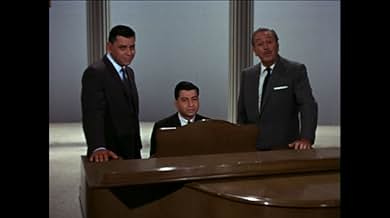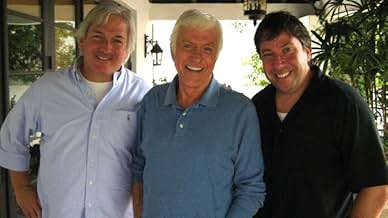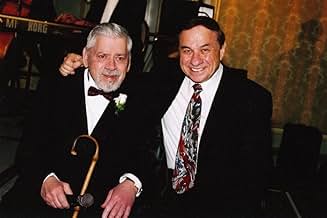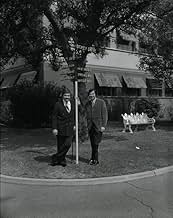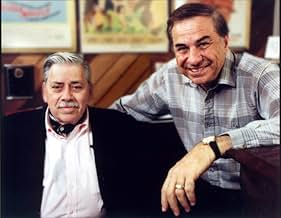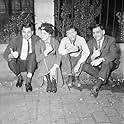IMDb RATING
7.7/10
1.4K
YOUR RATING
Their music is unforgettable. Their name is legend. Delve into the lives and cinematic legacy of the prolific songwriting duo whose music has been featured in classic movies such as Mary Pop... Read allTheir music is unforgettable. Their name is legend. Delve into the lives and cinematic legacy of the prolific songwriting duo whose music has been featured in classic movies such as Mary Poppins (1964) and The Jungle Book (1967).Their music is unforgettable. Their name is legend. Delve into the lives and cinematic legacy of the prolific songwriting duo whose music has been featured in classic movies such as Mary Poppins (1964) and The Jungle Book (1967).
Roy Edward Disney
- Self
- (as Roy E. Disney)
Featured reviews
This is the third Disney documentary I've seen in the last couple months (this includes this film, "Walt and El Groupo" and "Waking Sleeping Beauty") and all three were enjoyable bits of nostalgia. However, unlike these other two films, the Shermans were most famous for their work but they wrote music for a wide variety of projects--not just ones for that studio.
The film begins in a way that took my by surprise. Apparently it was made by one of Bob Sherman's sons and one of Dick Sherman's sons. Neither knew each other and their families never really interacted--despite their fathers being brothers and long-time writing partners! Now that is weird and caught my attention, as it seems that over the years the two became more and more estranged from each other and were so unalike. What follows is a nice nostalgic look at these men and their lives and shows the many ways in which their music has shaped films and our culture.
The film is well made, fascinating and great for Disney fans and non-fans. While not as amazingly good as "Waking Sleeping Beauty", it is some documentary.
The film begins in a way that took my by surprise. Apparently it was made by one of Bob Sherman's sons and one of Dick Sherman's sons. Neither knew each other and their families never really interacted--despite their fathers being brothers and long-time writing partners! Now that is weird and caught my attention, as it seems that over the years the two became more and more estranged from each other and were so unalike. What follows is a nice nostalgic look at these men and their lives and shows the many ways in which their music has shaped films and our culture.
The film is well made, fascinating and great for Disney fans and non-fans. While not as amazingly good as "Waking Sleeping Beauty", it is some documentary.
Richard and robert are the sherman brothers. Two brothers, a song writing team, who started out on their own, and were later hired by disney. Their two families didn't meet until much later in life.they wrote some pretty big songs ( spoonful of sugar, it's a small world after all, so many more) for some pretty huge films (bedknobs and broomsticks, chitty chitty bang bang, winnie the pooh). And they won two oscars and three grammies ! Lots of time spent on walt disney, and some behind the scene stuff that disney was doing at the time. Fun footage of walt disney himself, julie andrews. Angela lansbury, even several sherman family members. Really interesting stuff! Directed by greg and jeff sherman. They are cousins, two sons of of the sherman brothers. More details on the shermans and their work at wikipedia dot org.
"The Boys: The Sherman Brothers Story" is a terrific documentary produced by the sons of the famous composing team of Robert and Richard Sherman ("Mary Poppins," "The Jungle Book," "Chitty Chitty Bang Bang") about their fathers and their complex relationship.
Robert, for example, the older brother and "poet," who wrote so beautifully of sweetness and optimism, was in the very first group of GIs to liberate the Dachau concentration camp, which had a profound impact on him and his relationships, especially with his brother.
And how do these famous songs come about? When one of the composers' sons came home and said he had some sort of anti-polio treatment at school, the father assumed it was a shot and said, "That must have hurt." The son replied, no it was medicine he swallowed after they gave him a lump of sugar to take beforehand. Voila! The birth of the famous "Mary Poppins" tune, "A Spoonful of Sugar (Helps the Medicine Go Down)."
Fascinating stuff on so many levels, it will interest music aficionados, Disney fans, students of Hollywood history and even those who really know very little of these particular gentlemen.
Well worth your time.
And, Hollywood, if you're listening -- how about a movie telling their story? Terrific stuff.
Robert, for example, the older brother and "poet," who wrote so beautifully of sweetness and optimism, was in the very first group of GIs to liberate the Dachau concentration camp, which had a profound impact on him and his relationships, especially with his brother.
And how do these famous songs come about? When one of the composers' sons came home and said he had some sort of anti-polio treatment at school, the father assumed it was a shot and said, "That must have hurt." The son replied, no it was medicine he swallowed after they gave him a lump of sugar to take beforehand. Voila! The birth of the famous "Mary Poppins" tune, "A Spoonful of Sugar (Helps the Medicine Go Down)."
Fascinating stuff on so many levels, it will interest music aficionados, Disney fans, students of Hollywood history and even those who really know very little of these particular gentlemen.
Well worth your time.
And, Hollywood, if you're listening -- how about a movie telling their story? Terrific stuff.
"The Boys: The Sherman Brothers' Story" is a documentary about Robert and Richard Sherman, the legendary songwriting brothers who composed the music for such films as "The Jungle Book," "Chitty Chitty Bang Bang," "Bednobs and Broomsticks" and their indisputable masterpiece "Mary Poppins," which features one of the finest scores ever written for an original movie musical.
Though "The Boys" was produced and distributed by The Disney Studios - for whom the duo worked for many years – and was written and directed by their sons, Gregory V. and Jeff Sherman, this is no hagiography designed to provide a whitewashed account of its subject. On the contrary, it provides us with a warts-and-all look at the siblings who, while they could make great music together on a professional level, found it virtually impossible to harmonize on a personal one. In fact, their relationship was so strained that they essentially raised their families in isolation from one another (they even attended separate funeral receptions when their parents passed away) - and still today, the two men, even in the twilight of their lives, have yet to heal the breach that separates them.
What's interesting – and, frankly a little maddening - about the film is that we're never quite sure what it is that caused this rupture, mainly because the boys themselves seem unable to account for it (half the time they seem to be unaware it even exists). All we know is that, for decades in public, they were able to put on a happy face and maintain the fiction that they were every bit as close as brothers as they were as songwriters, while out of the limelight and to the awareness of those who knew them, they had drifted irrevocably apart.
Through interviews with their children, co-workers and admirers over the years, as well as with Bob and Dick themselves, the movie chronicles their childhood growing up in New York City, then Beverly Hills; their devotion and indebtedness to their songwriting father, Al Sherman; Robert's injury in World War II and the trauma of helping to liberate Dachau; their early years writing pop songs together and with others; their entry into composing for the movies with a song for "The Parent Trap." Then it's on to their years as the only songwriters lucky enough to be under contract to Disney; their close personal relationship with Walt himself; their Oscar-winning triumph with "Mary Poppins;" their eventual split with the studio after the death of Walt; their later work through the '70s and beyond; and their reunion at the London premiere of the stage version of "Poppins" in 2006.
Despite the fact that the rift between the two is never adequately explained, the movie provides a treasure-trove of information, clips and snippets from that period in which they produced their work. There are moments of ribald humor and wistful nostalgia as we relive the memories the Sherman boys have provided for those of us fortunate enough to have grown up on their songs (they were even responsible for that most maddeningly memorable of ditties, "It's a Small World"). Indeed, in the face of all the personal animosity between the two men, it's the music and the memories that ultimately "help the medicine go down" while watching "The Boys: The Sherman Brothers' Story."
Though "The Boys" was produced and distributed by The Disney Studios - for whom the duo worked for many years – and was written and directed by their sons, Gregory V. and Jeff Sherman, this is no hagiography designed to provide a whitewashed account of its subject. On the contrary, it provides us with a warts-and-all look at the siblings who, while they could make great music together on a professional level, found it virtually impossible to harmonize on a personal one. In fact, their relationship was so strained that they essentially raised their families in isolation from one another (they even attended separate funeral receptions when their parents passed away) - and still today, the two men, even in the twilight of their lives, have yet to heal the breach that separates them.
What's interesting – and, frankly a little maddening - about the film is that we're never quite sure what it is that caused this rupture, mainly because the boys themselves seem unable to account for it (half the time they seem to be unaware it even exists). All we know is that, for decades in public, they were able to put on a happy face and maintain the fiction that they were every bit as close as brothers as they were as songwriters, while out of the limelight and to the awareness of those who knew them, they had drifted irrevocably apart.
Through interviews with their children, co-workers and admirers over the years, as well as with Bob and Dick themselves, the movie chronicles their childhood growing up in New York City, then Beverly Hills; their devotion and indebtedness to their songwriting father, Al Sherman; Robert's injury in World War II and the trauma of helping to liberate Dachau; their early years writing pop songs together and with others; their entry into composing for the movies with a song for "The Parent Trap." Then it's on to their years as the only songwriters lucky enough to be under contract to Disney; their close personal relationship with Walt himself; their Oscar-winning triumph with "Mary Poppins;" their eventual split with the studio after the death of Walt; their later work through the '70s and beyond; and their reunion at the London premiere of the stage version of "Poppins" in 2006.
Despite the fact that the rift between the two is never adequately explained, the movie provides a treasure-trove of information, clips and snippets from that period in which they produced their work. There are moments of ribald humor and wistful nostalgia as we relive the memories the Sherman boys have provided for those of us fortunate enough to have grown up on their songs (they were even responsible for that most maddeningly memorable of ditties, "It's a Small World"). Indeed, in the face of all the personal animosity between the two men, it's the music and the memories that ultimately "help the medicine go down" while watching "The Boys: The Sherman Brothers' Story."
Their music is unforgettable. Their name is legend. Immerse yourself in the lives and film legacy of the prolific songwriting duo whose music was featured in classic films such as Mary Poppins (1964) and Mowgli, the Wolf Boy (1967).
Watching Disney documentaries and being delighted with the tributes it has paid to the professionals behind the great works, simultaneously watching Frank and Ollie (two more than fraternal friends, excellent designers) and the Sherman brothers (two musically talented brothers, but not they got along well, they separated for years) wonderful masterpieces, well-deserved tributes, sincere, transparent, necessary and passionate works... This troubled union generated great successes...
Watching Disney documentaries and being delighted with the tributes it has paid to the professionals behind the great works, simultaneously watching Frank and Ollie (two more than fraternal friends, excellent designers) and the Sherman brothers (two musically talented brothers, but not they got along well, they separated for years) wonderful masterpieces, well-deserved tributes, sincere, transparent, necessary and passionate works... This troubled union generated great successes...
Did you know
- TriviaAll entries contain spoilers
- Quotes
Robert B. Sherman: [talking about Mary Poppins author P.L. Travers] She was such a witch.
- Crazy creditsA clip from Charles A. Lindbergh (1927) is shown during the credits.
- ConnectionsEdited from Hollywood goes to a World Premiere (1964)
- SoundtracksLindbergh Eagle of the USA (1927)
Music by Al Sherman
- How long is The Boys?Powered by Alexa
Details
- Release date
- Country of origin
- Official site
- Language
- Also known as
- The Boys: The Sherman Brothers' Story
- Filming locations
- Production companies
- See more company credits at IMDbPro
Box office
- Gross US & Canada
- $55,513
- Opening weekend US & Canada
- $14,632
- May 24, 2009
- Gross worldwide
- $55,513
- Runtime
- 1h 41m(101 min)
- Color
- Sound mix
- Aspect ratio
- 1.78 : 1
Contribute to this page
Suggest an edit or add missing content







